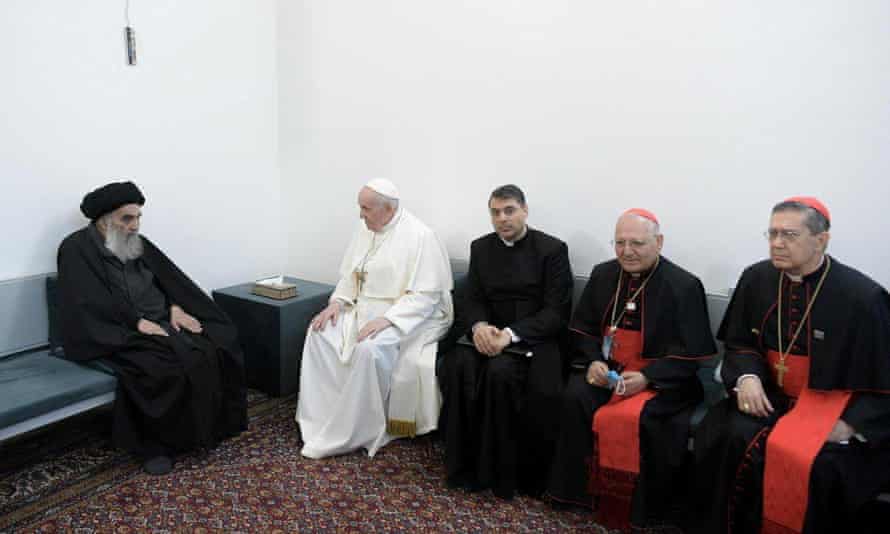
Pope's visit to Iraq
text_fieldsThe Pope when he visited Ayatullah Sistani
Pope Francis' four-day visit to Iraq carries special importance. The very fact that this is the first time a Pope is visiting the country described as the "cradle of civilisation", itself makes it historic. Besides, when someone like the Pope visits a country ransacked by occupation and war of the IS, it must be welcomed regardless of the inherent weakness of the visit. The pope and team, who reached Baghdad on Friday, travelled through the five provinces stricken by misery and conversed with several. The three events attended by the Pope deserve particular mention. One of them was addressing believers at a stadium in Erbil, the capital of Kurdistan. After visiting demolished churches in Nineveh and Mosul, the Pope found time for believing and non-believing Iraqis. He was able to listen to the thousands who lost everything in the occupation of the allies and the attacks of IS and to hold them close. He returned to Rome on Monday after an hour-long meeting with Najafi, Shia scholar Ayatullah Ali Sistani.
The Pope returned after spreading the messages of peace and fraternity. He began each of his programs praying for the refugees in Iraq, irrespective of religion. Ending his speech in the Erbil stadium, he emotionally cried out 'Salam, Salam, Salam,' to the audience, in a historic act of solidarity with the Arab world. We can see a continuation from his 2019 visit to the UAE. Addressing the world from Sheikh Zayed Sports stadium in Abu Dhabi, he had then called for a world free of war and filled with peace and prosperity. He signed the Declaration of Human Brotherhood to promote friendship and peace between different religions and nations. He referred to the dire political situation in Iraq, Yemen, Syria and Libya. This visit to Iraq shows that the peace mission did not end there.
It is obvious and natural that the Pope's visit has religious dimensions. Where two decades ago, Iraq had over 13 lakh Catholic believers, the numbers have now dwindled to below 4 lakhs. Two years ago, Archbishop Bashar Warda of Erbil made a strong statement that Christians were being wiped out in Iraq and that the global Christian Church was not intervening, an utterance that raised a debate. In 2014, more than 1.5 million Christians were forced to flee their homes and towns during the IS's armed conflict in northern Iraq. Several of their places of worship were also demolished during this period. But this has more or less been experienced by all religious groups in Iraq. Pope's visit and his prayers within the demolished churches follow the Archbishop's statement. However, he did not limit the visit to a mere 'church issue', but sought to be a source of comfort to all communities. He confronted present-day realities beyond beliefs and customs. It is narrow partisan politics and vested political interests that destroy this harmony by exploiting their faith and pitting believers against believers. It is the community of believers and their leadership that can survive this and lead the world back to peace. The Pope's visit to Iraq and the Bagdhad Muslim clergy's reception with open arms reinforce this.
We also see how evil forces use despicable means to create confusion and enmity between communities that have lived together in harmony, as seen in Kerala recently. This conspiracy is certain to make any person uncomfortable. In this context, the attempts of religious leaders to reignite the message of global humanity among their people must be viewed with optimism. Let us hope and pray that this would be a guiding message that drives us away from the darkness of separation and towards the light of togetherness.























